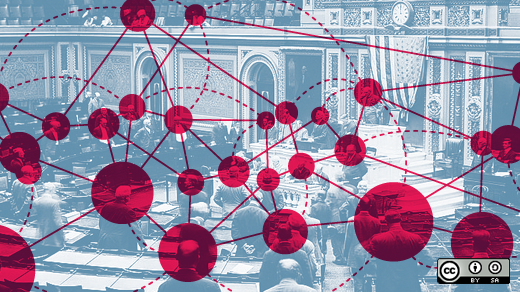If you've never been to a technical conference, you might be tempted to think it's the time out of the office and the free lunches that get people excited. Not that I'm opposed to a free lunch, but that's not even remotely why technical conferences are amazing. In fact, sometimes the lunch food is the worst part. But the conversation over lunch? Well, it could easily turn out to be the most important conversation you've had all year.
A chance to learn new tricks
The first and foremost reason to go to technical conferences is to learn new technical tricks.
Everyone is there to talk about the same platform, operating system, or programming language you are, so a high percentage of conversations are going to be interesting. In fact, the "hallway track" might save you weeks of frustration. Talk presenters are often sharing new strategies and workplace methodologies that you either haven't encountered or don't have the data to get your workplace to try.
Many presenters share slides and links to data to help you see why you should (or shouldn't) try that new thing everyone's been talking about. You might learn new techniques that save you money or shortcuts to help make your old techniques more efficient. You might even learn some guidelines for when to use a tool and when another tool is a better fit for the task at hand.
If you do any programming, conferences are prime place for learning about new or obscure libraries and packages that you haven't used before. If it's been done before, then someone somewhere will eventually give a talk about it.
Gain perspective
Free and open source software conferences are especially good for learning about how other companies and projects approach their work. This perspective can help you assess your project's strengths and weaknesses and give you a better sense of what position you occupy in the larger field. There might be a service that fills a need you barely knew you had, a volunteer project building a tool that you were going to build in-house, or a company doing exactly what you're doing but for a different continent, language, or market niche.
You might learn a little bit about why your competition is doing so well or figure out who you should be collaborating with, but either way you'll have the information you'll need to know what to do next.
Stay up-to-date on legal issues
Law and technology are becoming increasingly entwined, and many technical folks don't or can't make time in their regular schedules to stay on top of the issues. Conferences are a great place to learn about upcoming legislation, important court cases, and the organizations that are keeping an eye on the developments that affect both the FOSS community and the broader tech industry.
Staying abreast of legal issues can help you avoid heartache and save lots of money in the long run. The sooner you know what's coming and what's going to be possible in a year, the better off you are.
Find a new job (or a new employee)
Conferences are the perfect place to go when you're looking for a new challenge or when you're hiring for your own organization. It's like LinkedIn with a much better signal-to-noise ratio.
If the conference has booths or an expo floor, you'll find out who's hiring and for what kinds of positions, which can give you a sense of where the job market is going. I've seen on-the-spot interviews, recent grads handing their resume to a person who was ridiculously excited to receive it, and plenty of "What it's really like to work at XYZ company?" stories shared with job seekers. Even if you aren't looking, it's still good to give people a sense of what you're like. Then when you are looking for a new job at some later point, you aren't sending your resume to a complete stranger.
Not sure where to start? Lots of technical conferences even include a few formal or informal sessions on polishing your resume, getting the interview, and making a great impression when you come in.
Meet new people
Networking is another huge part of why people attend conferences. It's amazing to be able to talk with people who don't need tons of backstory to empathize with your struggles and achievements. Most people are interested in meeting other people too, so you can ask where someone works, what talks they've enjoyed, or just introduce yourself and it's fine. If that sounds a bit too terrifying, go to talks that interest you and then follow the speaker out of the room to engage in the post-talk chatter with other talk attendees.
You can also look for "birds of a feather" sessions where people go to talk about specific technologies, applications, or trends. If none of the "birds of a feather" sessions are what you're interested in, then you can usually propose your own.
Some conferences also have official (sometimes unofficial) dinners where attendees go to meet each other. If the conference doesn't have dinners, you can propose them. Even without an official channel, a physical post on the bulletin board, email to the conference mailing list, or a post using the conference hashtag on a micro-blogging site will usually net you a few lunch or dinner companions who are interested in talking about whatever topic you've proposed.
Conclusion
Going to technical conferences can be educational, eye-opening, and life-changing. You could learn something that is essential to the success of your project or business. You may find a new employee, a new job or make a lifelong friend.
Highlight the talks you need to go to, make a little time for the expo floor and consider proposing a "birds of a feather" session or a dinner to make sure you get the most out of your experience. And never forget, just because the lunch is free doesn't mean you're obligated to eat it.







Comments are closed.